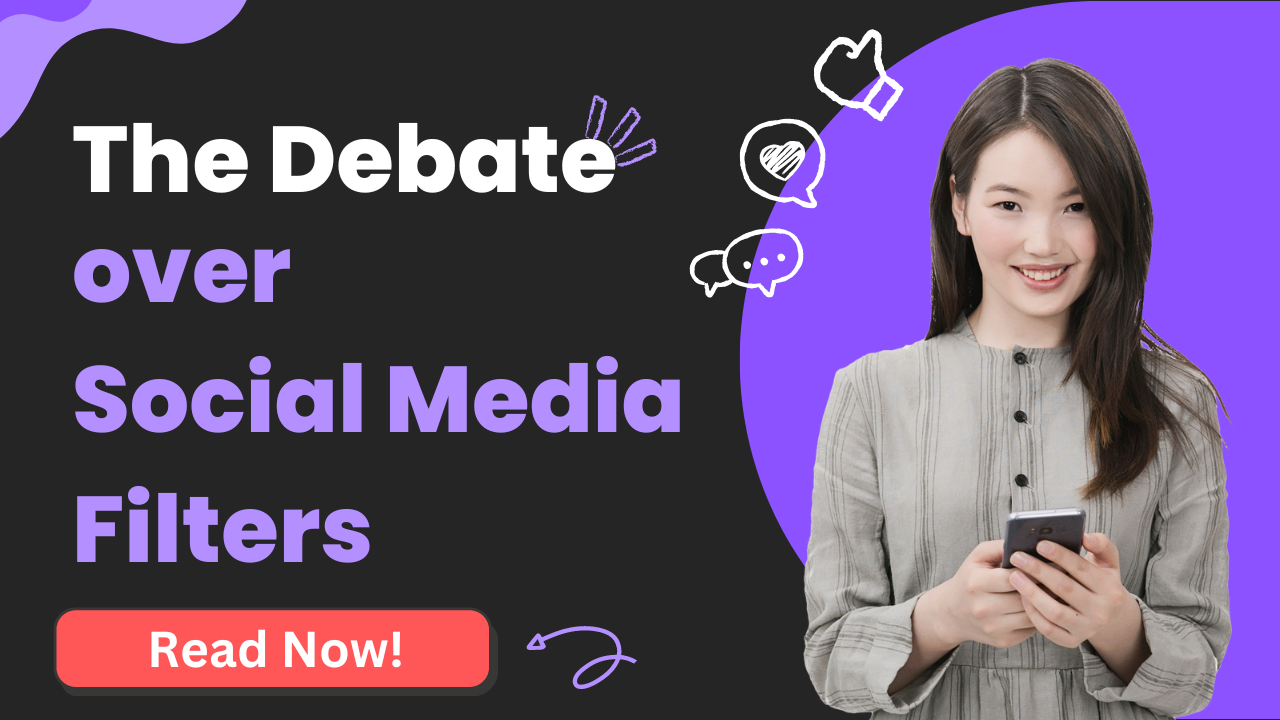 |
| Social media filters promote an unrealistic view of beauty. Some countries require advertisers and influencers to indicate retouching. |
The Debate Over Social Media Filters
Have you ever used a filter on social media to make yourself look different? Maybe you wanted to smooth out your skin or change the shape of your nose. Well, some people are worried that these filters are promoting an unrealistic view of beauty that can be dangerous, especially for young people.
Table Of Content
- The Apps
- The Debate
- The Regulations
- The Influencers
- Conclusion: Use Social Media Filters Ethically and Safely
- Some Questions For You
The Apps
Apps like FaceTune and Perfect365 allow users to make changes to their appearance in photos and videos. FaceTune even has a version specifically for short selfie videos. These apps are owned by companies that make a lot of money from them. For example, FaceTune's parent company was valued at $1.8 billion a few years ago.
The Debate
Some people think that these filters are unhealthy because they promote an unrealistic view of beauty. In a survey by skincare brand Dove, 80% of teenage girls said they had changed their appearance in an online photo by the age of 13. Others argue that these apps are a form of free speech and should not be regulated.
The Regulations
Some countries, like Norway and France, have introduced laws that require social media advertisers and influencers to indicate whether a photograph has been retouched. The UK is also considering similar regulations. Conservative MP Luke Evans wants the law to require the same admission for altered videos and any other tech developments.
The Influencers
Some social media influencers use filters to improve their online appearance because being good-looking sells. However, distorted perceptions of body image appear to be being exacerbated by common social media practices. Some people argue that these filters help people who are not body positive enough to present on social media.
Conclusion: Use Social Media Filters Ethically and Safely
The debate over social media filters continues to divide opinions. On one hand, some people argue that these filters promote an unrealistic view of beauty that can be dangerous, especially for young people. On the other hand, others believe that these apps are a form of free speech and should not be regulated.
Apps like FaceTune and Perfect365 allow users to make changes to their appearance in photos and videos. These apps are owned by companies that make a lot of money from them. For example, FaceTune's parent company was valued at $1.8 billion a few years ago.
The concern is that these filters may be harmful to people's mental health, as they may promote unrealistic beauty standards. In a survey by skincare brand Dove, 80% of teenage girls said they had changed their appearance in an online photo by the age of 13. This highlights the potential negative impact that social media filters can have on young people's self-esteem and body image.
However, some social media influencers use filters to improve their online appearance because being good-looking sells. While distorted perceptions of body image appear to be being exacerbated by common social media practices, some people argue that these filters help people who are not body positive enough to present on social media.
Some countries, like Norway and France, have introduced laws that require social media, advertisers, and influencers to indicate whether a photograph has been retouched. The UK is also considering similar regulations. Conservative MP Luke Evans wants the law to require the same admission for altered videos and any other tech developments.
As we navigate the impact of social media on our lives, it's important to remember that filters are just one aspect of the larger issue. Social media can be a powerful tool for connecting with others, sharing our experiences, and promoting positive messages. However, it can also be a breeding ground for negativity, comparison, and unrealistic standards.
One way to combat the negative effects of social media is to be mindful of how we use it. Instead of focusing on likes, followers, and validation, we can prioritize genuine connections and meaningful interactions. We can also challenge the beauty standards perpetuated by filters and promote diversity and inclusivity in our online communities.
Ultimately, the decision to use filters is a personal one, but we should be aware of their potential impact on our mental health and well-being. By using filters ethically and safely, we can navigate the complex world of social media and promote a positive, empowering message for ourselves and others.
So, the next time you consider using a filter on social media, ask yourself why you're doing it and how it makes you feel. And remember, true beauty comes from within, and no filter can ever change that.
Some Questions For You
While the debate over social media filters continues, it's important to use these apps safely and ethically. We should be aware of the potential mental health consequences of social media and strive to promote a positive body image for all. So, have you used a social media filter before? How do you feel about the impact of these filters on body image and self-esteem? Share your thoughts in the comments below.


.jpg)



1 Comments
https://www.wiz-official.tech/2023/05/yaccarino-as-new-twitter-ceo.html
ReplyDelete